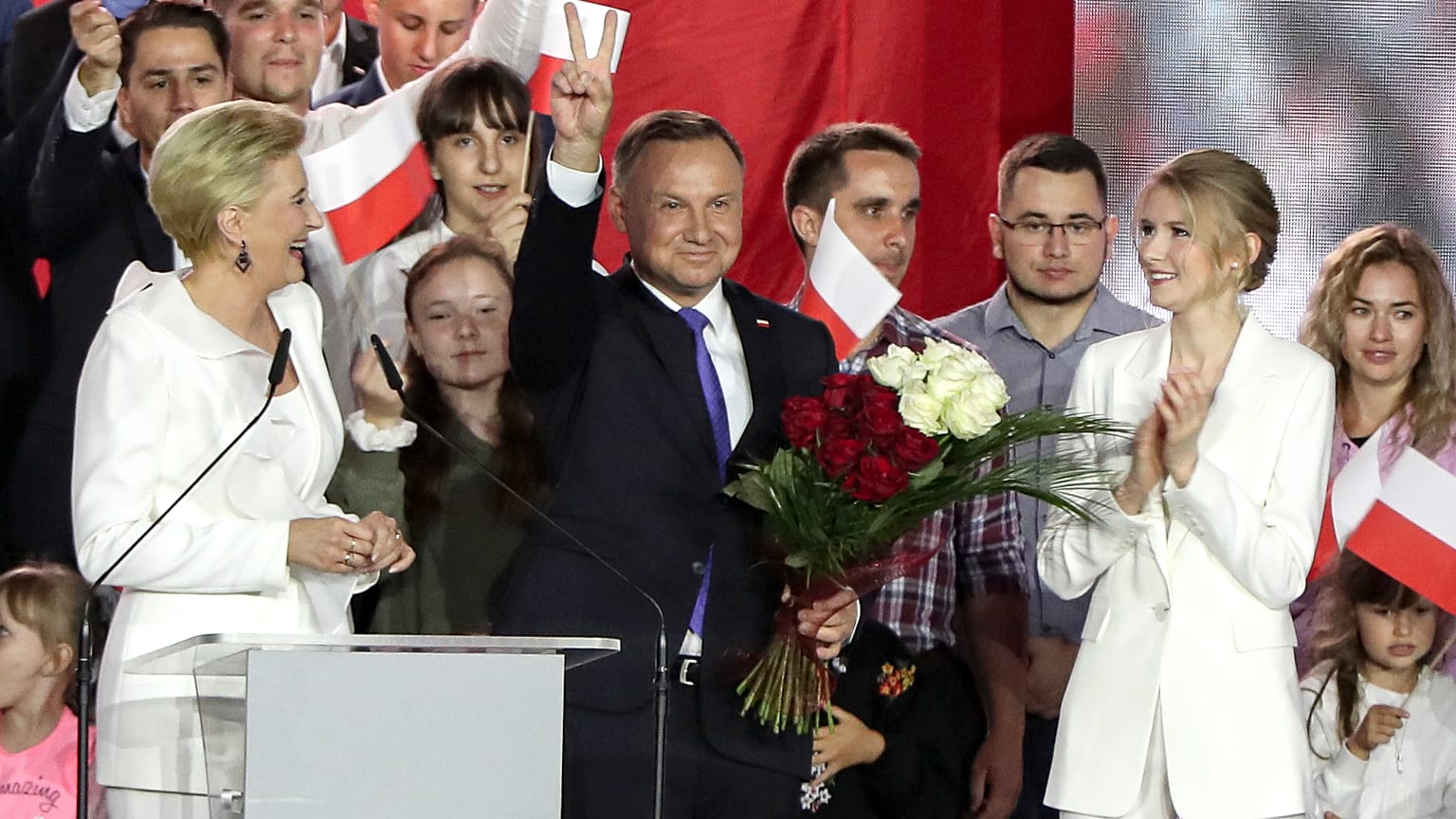Poland re-elected incumbent president Andrzej Duda in a tight second round. Here are five takeaways from the election.
Andrzej Duda won a narrow victory in a run-off presidential election over pro-EU Warsaw mayor Rafał Trzaskowski.
The divisive poll saw Duda run a campaign with alleged anti-Semitic and homophobic undertones as he fought to keep the presidency.
Duda received 51.08% of the vote while his centre-right opponent Trzaskowski trailed with 48.92% of the vote.
Here are five takeaways from the Polish election.
Poland remains deeply divided
The tight race in Poland further revealed that the country continues to be deeply divided.
Duda ran as an independent candidate allied with the ruling Law and Justice Party (PiS) on a socially conservative agenda.
He faced Trzaskowski in the second round of voting, who is pro-European and supports civil unions for same-sex couples and opposes tightening Poland's already strict abortion laws.
Trzaskowski launched an impressive campaign, only becoming a candidate after the election was delayed due to the coronavirus.
Experts said prior to the election it was a vote between two different visions of Poland.
"This is, of course, a win, but in a psychological and social sense it is not a triumph," said Ewa Marciniak, a political scientist at the University of Warsaw.
The election also saw a generational divide, she added, with young voters supporting Trzaskowski and older voters supporting Duda.
'Homophobic, xenophobic and anti-Semitic rhetoric'
Many have called out Duda's homophobic and anti-Semitic rhetoric during the campaign.
LGBT rights were a key divisive point between the two presidential candidates, with Duda promising to protect families from the "LGBT ideology", stating it was more dangerous than communism.
Trzaskowski’s platform, meanwhile, included support for civil unions for same-sex couples, opposition to the tightening of abortion laws and the restoration of state support for in-vitro fertilisation.
After winning the presidency, Duda said the campaign was perhaps too sharp, according to AP. Those who back Duda had suggested his opponent would sell out the country to Jewish interests.
The Organisation for Security and Cooperation in Europe, which monitored the election, said in a statement that the run-off campaign "more confrontational than for the first round".
"The incumbent’s campaign and coverage by the public broadcaster were marked by homophobic, xenophobic and anti-Semitic rhetoric," the organisation added.
Strained relationship with the EU
Poland's election is not likely to improve relations with the European Union which has criticised the country's judicial reforms.
The EU has said the reforms jeopardise the separation of powers between the government and the judiciary.
The bloc launched its Article 7 procedure against Poland, determining that there was a risk to EU values and the independence of the judiciary. The proceedings could lead to sanctions including the loss of EU voting rights.
In 2018, Duda had referred to the EU as an "imaginary community" that does little to help Poland.
Read more: What does Duda's victory mean for EU-Poland relations?
High turnout
Turnout was high at 68.1%, coming close to the record set in 1995. This will give the president more "legitimacy," said Marciniak at the University of Warsaw.
More than 10 million people voted for Duda which she says is "a record".
"At the same time, almost 10 million opposition voters are [sending a message] to Duda that his opponents are a huge group of people and he should also be president for them," she added. "This is a difficult task, but Duda must start doing it."
"It's an irony that, in an election where many see a negative development for democracy moving forward, such a sign of democratic health like high participation took place. But high participation is not a neutral development, it also carries political implications," said Angelos Chryssogelos, a lecturer in Politics and International Relations at London Metropolitan University
"It points to the success of Duda and PiS to mobilise voters - older, rural, less educated - who are positively inclined towards them but traditionally vote in fewer numbers than urban liberal voters."
Free rein until parliamentary elections
It remains to be seen how the vote will impact Poland's future policies, although critics of the ruling party say this will cement their socially conservative policies.
But many have also credited the ruling party will lowering inequality in Poland through economic support measures and social welfare programmes.
Multiple experts have said the win for Duda could essentially cement the ruling party's positions giving them significant leeway until the next elections which are not until 2023.
"The government is now free to pursue its agenda by controlling almost all levers of powers in the Polish political system, although Duda's close margin of victory shows that its dominance should not be taken for granted for too long; an economic recession of infighting in the governing camp may undermine it in the coming years," said Chryssogelos.
This article has been updated to add expert commentary.















